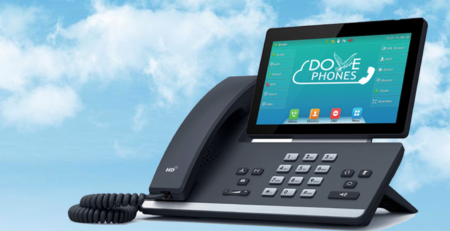How a Digital Telephone System Can Revolutionize Your Business Communication
It’s rare that a solution simplifies your business while also being more feature-rich and better for your bank account. You get exactly that and more with a digital telephone system. Traditionally, businesses relied on analog phone lines, but the shift to digital systems has brought significant improvements in reliability and features. For years, private branch exchanges (PBX) have been a cumbersome yet necessary piece of your business, but with the recent advances in business phone systems, that headache’s now gone. The massive upfront investments in a phone system and the ongoing in-house maintenance are a thing of the past. According to a study from G2, a small business can slash its startup costs by up to 90 percent and up to 50 percent in ongoing costs when switching to a VoIP business phone system.
Typically, your phone system isn’t at the top of your list of priorities, but it really needs to be. We’ll get into it further, but the flexibility and reliability of a digital telephone system could be the advantage your business needs. When was the last time you looked into your phone system?
What is a Business Phone System?
A business phone system from Dove Communications is a VoIP-powered multi-line phone solution that provides unlimited calling, business texting, call recording, voicemail options, call management, and other advanced features. The best part is that this powerful communication tool runs through your internet connection, simplifying the deployment and management of the system. This business VoIP service is crucial in modern communication, offering enhanced capabilities and flexibility for small to medium-sized businesses (SMBs).
The wide range of available features allows you to choose the best way to interact with customers. This level of customization improves internal and external communications, saves business costs, and offers high levels of reliability and security. A business phone system is a unified communications solution for small businesses that, no matter where you are or what type of device you’re on, as long as you have a decent internet connection, you can help your customers. When considering a business VoIP system, it’s vital to evaluate its pricing structures, which can be influenced by user numbers and required features. Carefully assessing various options ensures that the specific needs of your business are met, including potential upgrades from existing systems.

How Does a Digital Telephone System Work?
A digital telephone system handles company communications through the internet, using Voice over Internet Protocol (VoIP). You most likely have used VoIP in some form without even knowing it. With newer cell phones, there are options for Wi-Fi calling, which is essentially VoIP. When using VoIP business phone systems, voice calls are converted into network packets and transmitted over the internet or other IP-based networks. Although the technical details can be fascinating, the point remains: you can harness powerful business phone features over the internet for a fraction of the cost.

Benefits of VoIP Business Phone Systems
Advantages of a Digital Telephone System
VoIP supplanted traditional PBX phone systems because it is less expensive but far more versatile. The shift from primarily on-premise phone systems to cloud-based business communication opens your employment opportunities. Your business deserves the best talent, which shouldn’t be restricted by location. Selecting a VoIP provider is crucial as they offer dedicated technology and customer service, helping businesses manage communication challenges and ensuring reliable business phone systems. Time to get into the nitty-gritty of the advantages.
Flexibility
If anything can be learned from the events of the last five years, you must be able to adapt at a moment’s notice. With a cloud-based phone system, you can choose how you connect to the system. This doesn’t mean you immediately have to make remote work an offering of your business; it might not function properly remotely, but what it means is that you get to make the best operating decisions for your business. Make certain that you have the technology available to run your business how you need to.
Redundancy
You never know when something out of your control will hit your business. It could be a natural disaster, power outage, fire, flood, the terrifying list goes on. Not being tied down with a physical system in your office means you can be proactive and plan for anything. Build an “always on” communication plan into your disaster recovery outline. A report from FEMA found that 43 percent of small businesses affected by a disaster never reopen. Beyond that, 29 percent went out of business within two years of the disaster. With server redundancies spread across the United States, if any disruption is detected, your connection will immediately failover to another site without losing calls or any change in service quality.
Mobility
Freedom lives in being able to connect from anywhere. For instance, you have traveling salespeople, and even on a plane, they can connect with clients through voicemail-to-email. More deals are won when customers get speedy responses. Mobility also offers a simple, one-stop-shop for customers. No more do you need to give out a cell, office, or fax number; one number will connect any and all ways of contacting you.
Scalability
You can add or remove people in the system on the fly. With an easy-to-use web management of your phone system, you can have a new employee connected to the system within minutes after training is completed. Additionally, you don’t have to worry about a surge in calls being missed because the system is overwhelmed; that doesn’t happen with digital telephone systems. You’re covered even during the busiest of times.
Business Phone System Features
Advanced Features for Your Small Business
You may or may not think advanced features are necessary, but believe it or not, they’re more necessary than you might imagine. According to a recent Salesforce study, 65 percent of customers expect companies to adapt to their changing needs and preferences. Customers are on the move and need to be able to connect with your business when it’s convenient for them, so something as simple as chatting through your website could keep a customer long-term. The product or service you offer is essential, but it’s only part of the relationship.
When considering a digital telephone system, look for features, integrations, and pricing benefits specifically designed to enhance communication and productivity for small businesses.
Here are some additional features that will improve your communication infrastructure:
- Visual Voicemail: Easily manage voicemails in a single place, with transcripts and voicemail to email.
- Enterprise Contacts: Access to enterprise contacts through your desk phone or on your mobile device and start calls, meetings, or chats with a click of a button.
- Meetings/Video: Built-in conferencing capabilities, either internally or outside the company, with optional video.
- Screen Sharing: Get to issue resolution faster with the ability to screen share without leaving your calling environment.
- Chat/Presence Management: Reduce confusion with a live presence for all users to see. If someone is on a call, you can send them a chat and collaborate more easily.
- Call Recording: You can view, listen, search, and download call recordings for training or quality assurance purposes.
Choosing the Best Business Phone System
Choosing the best business phone system can feel overwhelming with the myriad of options available. However, by focusing on a few key factors, you can make an informed decision that aligns perfectly with your business needs.
First, determine your business requirements. Consider the number of users, the features you need, and the functionality that will best support your operations. Whether you need call recording, voicemail options, or video conferencing, knowing your needs will help narrow down your choices.
Next, evaluate the types of phone systems available. You can choose between on-premise, cloud-based (digital telephone systems), or hybrid phone systems. On-premise systems offer control and customization, while cloud-based systems provide flexibility and ease of management. Hybrid systems combine the best of both worlds.
Scalability is another crucial factor. Your business phone system should be able to grow with your business. Whether adding new employees or expanding to new locations, your phone system shouldn’t stand in the way, and it should easily accommodate these changes.
Compatibility is also key. Ensure the phone system you choose works seamlessly with your existing infrastructure and devices. This will save you time and money in the long run.
Finally, do your research. Read reviews and ask for referrals from other businesses. This will give you insights into the experiences of other users and help you choose a reliable provider.

Network Requirements for VoIP
To ensure a smooth and reliable VoIP experience, remember that your network must meet certain requirements. Here are some key considerations to keep in mind:
- Bandwidth: Ensure your internet connection has sufficient bandwidth to support VoIP traffic. A higher bandwidth will accommodate more simultaneous calls and ensure better call quality.
- Quality of Service (QoS): Implement QoS policies to prioritize VoIP traffic over other types of data. This will help maintain high-quality calls even during peak usage times.
- Latency: Minimize latency to ensure real-time communication. Latency should ideally be below 150 milliseconds to avoid delays in voice transmission.
- Jitter: Reduce jitter to prevent packet loss and ensure clear calls. Jitter buffers can help manage variations in packet arrival times.
- Packet Loss: Minimize packet loss to ensure reliable communication. Packet loss should be less than 1% to maintain call quality.
By addressing these network requirements, you can ensure a seamless VoIP experience for your business.
Unified Communications as a Service (UCaaS)
What is UCaaS?
UCaaS (Unified Communications as a Service) integrates various communication and collaboration technologies. Surprise! This entire article has been describing Dove Phone from Dove Communications, which is unified communications at its finest. UCaaS provides a consistent user interface and experience across multiple devices, making it an easy-to-adopt solution.
None of this was a gotcha moment, but through our experience, we’ve found that business terms are often overused or not defined properly, so we wanted to take the time to go deep into what UCaaS can do to improve your business before pulling the curtain back.

The Future is Here: Dove Communications Has a Digital Telephone System for You
The idea is to transition to something that’ll make a positive difference to your business, not only to the bank account but also to the customers and employees using it every day. Phone systems are a piece of the interconnected business technology realm we live in. Beyond phones, we offer surveillance systems, managed IT services, cabling, access control, and more. Contact us today! We’d love to help your business soar to new heights.









